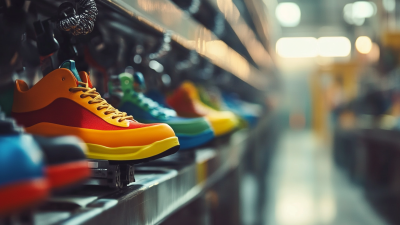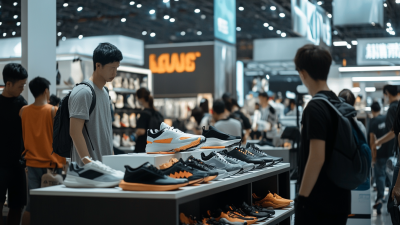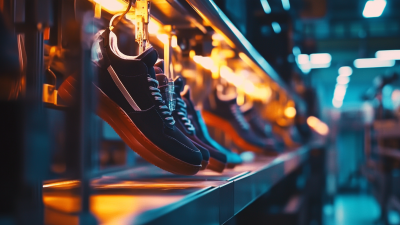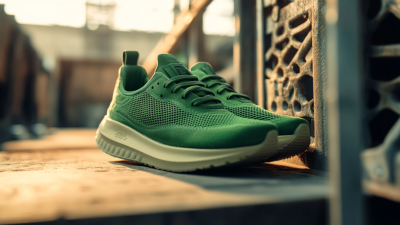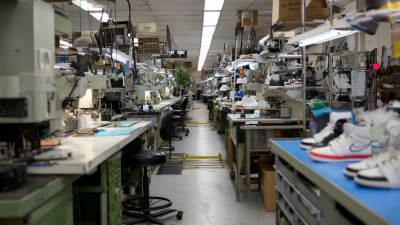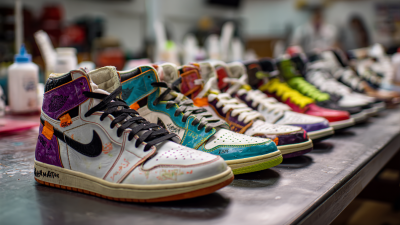
When it comes to launching a successful sneaker line, selecting the right OEM sneaker manufacturer can be a game-changing decision. With the market inundated with choices, brands must navigate the various features and benefits offered by different manufacturers to align with their vision, quality standards, and budget considerations. This comprehensive comparison will delve into the essential factors that define an ideal OEM sneaker manufacturer, exploring alternatives that can cater to diverse needs.
 From production capabilities to design flexibility, and quality assurance processes, understanding these key elements can empower brands to make informed choices.
As we unpack the alternatives available in the industry, we'll uncover how the right partnership can elevate your sneaker brand, ensuring not just product excellence but also a seamless journey from concept to consumer.
From production capabilities to design flexibility, and quality assurance processes, understanding these key elements can empower brands to make informed choices.
As we unpack the alternatives available in the industry, we'll uncover how the right partnership can elevate your sneaker brand, ensuring not just product excellence but also a seamless journey from concept to consumer.
When it comes to choosing the right OEM sneaker manufacturer, understanding your specific manufacturing needs is crucial. First, assess your business model by considering your target audience, production volume, and design complexity. For instance, if your brand focuses on high-end, customized sneakers, you'll need a manufacturer that specializes in intricate designs and utilizes quality materials. Conversely, a brand that prioritizes affordability and mass production might benefit from partnering with a manufacturer known for efficiency and cost-effectiveness.
Moreover, it's essential to evaluate your supply chain logistics. Are you looking for a manufacturer with local production capabilities to reduce shipping costs and time? Or is overseas manufacturing acceptable to you, provided that you can manage quality control remotely? By clarifying these logistical aspects, you can identify an OEM partner that aligns with your operational requirements and ensures that your sneaker production runs smoothly and meets market demand more effectively.
This bar chart compares various OEM sneaker manufacturers based on critical features such as quality, lead time, cost, customization options, and minimum order quantity. This comparison aims to assist businesses in making informed decisions when selecting a manufacturer that aligns with their operational needs.
When selecting an OEM sneaker manufacturer, various key features should be considered to ensure quality and efficiency. One significant aspect is the manufacturer's production capacity. It's essential to choose a partner capable of scaling production as your business grows. A manufacturer with advanced technology and a skilled workforce often delivers higher quality products, leading to better customer satisfaction.
Tip: Always assess the manufacturer’s previous work and seek samples before making a commitment. This helps gauge their design capabilities and adherence to quality standards.
Another important feature is the ability to customize products. A good OEM manufacturer should offer a range of customization options, from materials and colors to unique designs. This flexibility allows brands to differentiate their products in a competitive market.
Tip: Communicate your specific design needs clearly and ask about the minimum order quantities for customized options. This will ensure you understand the costs and logistics involved, helping you make a more informed decision.
When considering OEM sneaker manufacturing, one of the critical decisions is whether to partner with local or overseas manufacturers. Local manufacturers typically offer benefits such as shorter lead times and easier communication. Proximity allows for more seamless collaboration and quicker adjustments to design or production issues. Moreover, local manufacturers often adhere to stricter labor and environmental regulations, which can enhance brand reputation and consumer trust.
On the other hand, overseas manufacturers can provide significant cost savings, particularly for larger production runs. Countries with established manufacturing infrastructures often have lower labor costs, leading to reduced pricing for consumer products. However, working with overseas partners may introduce complexities such as longer shipping times and potential challenges in quality control. Understanding these trade-offs is essential for brands looking to optimize their manufacturing strategy and deliver quality sneakers to the market efficiently.

When selecting an OEM sneaker manufacturer, one of the most critical factors to consider is the quality control and production standards they uphold. A reputable manufacturer implements rigorous quality assurance protocols at every stage of the production process. This includes thorough inspections of raw materials, in-process checks during manufacturing, and final audits of the finished product. Ensuring that these steps are consistently followed can significantly reduce the risk of defects and enhance the durability and aesthetic appeal of the sneakers.

Furthermore, adhering to international production standards is essential for maintaining quality and safety. Manufacturers that comply with recognized certifications, such as ISO standards, demonstrate a commitment to excellence. These standards often cover various aspects, including environmental impact, worker safety, and product safety, providing assurances that the sneakers produced not only meet customer expectations but also contribute to ethical manufacturing practices. By prioritizing quality control and production standards, companies can build a reliable partnership with their OEM sneaker manufacturer, leading to successful and sustainable product lines.
When selecting the right OEM sneaker manufacturer, cost considerations play a pivotal role in establishing a successful partnership. Brands must strike a balance between quality and price, ensuring that their investments yield high-quality products that resonate with consumers. As seen in various industries, including the automotive sector, a major delay or compromise in quality can incur significant costs. For example, a 12-month delay can cost an OEM millions, emphasizing the necessity of not only affordability but also reliable delivery schedules and performance.
**Tips:** When negotiating with potential manufacturers, it’s critical to assess their production capabilities and past performance. Request samples and verify the quality of materials, as this directly impacts the end product's durability and appeal to consumers. Additionally, consider conducting thorough due diligence on their reputation and past collaborations to assess reliability.
Another key factor in cost considerations is the examination of the overall supply chain. With fluctuations in market conditions, like the current investments seen in the manufacturing industry despite economic challenges, brands should remain agile and adaptable in their partnerships. Understanding how a manufacturer navigates these challenges will be essential in ensuring the long-term viability of your sneaker line.
**Tips:** Be proactive in discussing production timelines and potential risks associated with material sourcing and labor. Build a relationship of transparency with your manufacturer to foster mutual trust and collaboration, ensuring that both parties can find workable solutions when faced with challenges.
